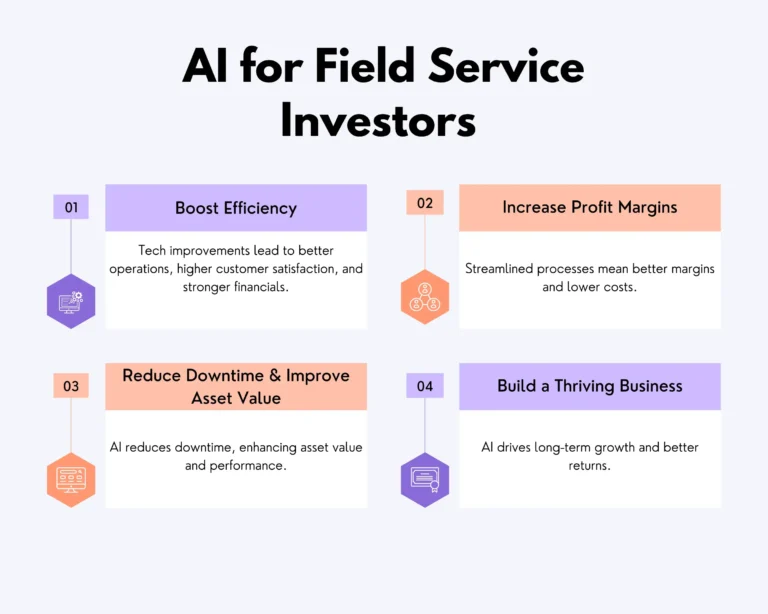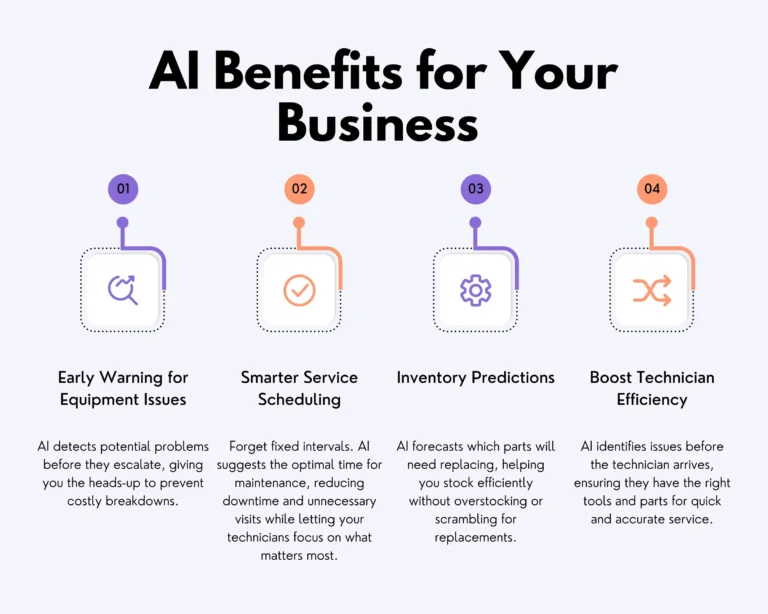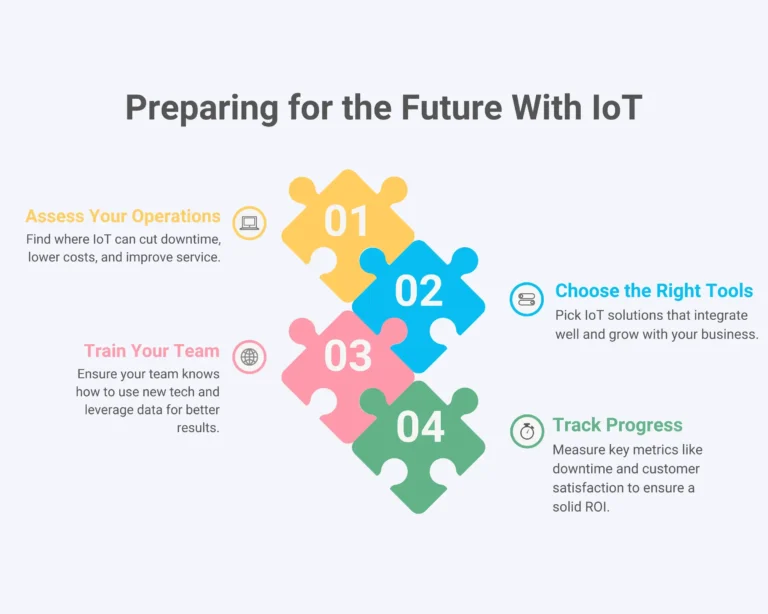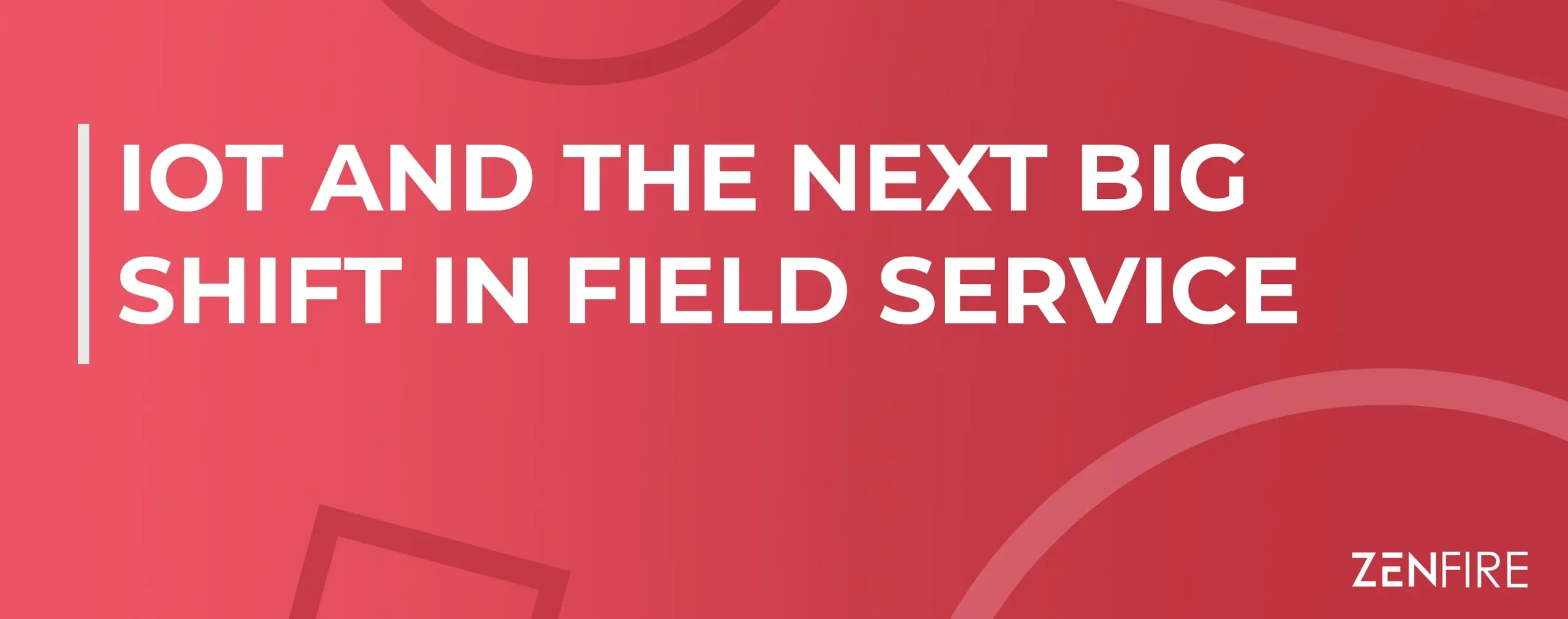How IoT Will Impact The Future of Field Service
- Private Equity
Field service management is evolving. And with the arrival of the latest technologies and cutting-edge advancements, the vitality of adopting and staying ahead of the curve has never been more.
Businesses have moved on from traditional, old-school methods of running a business and handling their assets or equipment manually. They are now focusing more on advanced and intuitive AI-driven software and tools, or on a broader level, ‘The Internet of Things (IoT).’

For investors or private equity firms focused on value creation and growth for their portfolio companies in the field service sector, as well as business owners — this change is not just another trend but a competitive advantage. Adapting these trends as quickly as possible is a highly strategic move to make your business stand out from the rest, be lucrative to investors, and overachieve your revenue targets.
Businesses that embrace the changes and recognize the importance of the future landscape will undoubtedly witness better efficiency among their employees, cut down on costs, and enjoy higher profit margins and revenue. But first, let’s understand what the future holds for field service businesses and how businesses can stay stay prepared for the same.
In this blog, we will talk about how IoT and Artificial Intelligence are changing the entire field service industry and how business owners and investors can leverage these innovations to the fullest. Also, through these added technology in field service business, has raised a sudden spark of investment opportunities, in which private equites are also interested..
Here What We Cover

Role Of IoT In Field Service Management
The Internet of Things (IoT) allows all your devices and systems to connect to each other. Embedded with sensors, these devices collect data, which can then be shared with other software platforms for analysis.
When we talk about field service business and IoT, it means that the devices or equipment connected are able to communicate with each other, even when they are not operating at their highest level. So, when there is a chance of breakdown of any system or equipment, IoT can help prevent it by giving early warning signs and notifying beforehand.
This is a game-changer for business owners and stakeholders because it helps reduce downtime incurred by critical equipment and devices. When equipment is down, it directly impacts the business’s revenue. Delayed repairs and replacements can cost a fortune — both in terms of money and time. IoT, in this case, helps you get an early warning about any potential system failure, optimize maintenance and servicing schedules, and extend the life expectancy of your critical assets. It’s like supervising your systems around the clock without keeping them under constant watch.
Now this, combined with the transformative powers of Artificial Intelligence (AI) — that is a combo bond that can help you take your business to new altitudes.
AI for Preventive Maintenance

Artificial intelligence has played a crucial role in transforming how we approach preventive maintenance. It has made it smarter, more efficient, and more cost-effective than the rest. The data stored in the system, collected by IoT, is analyzed and cracked open for patterns. The AI identifies these patterns and predicts whether a machine works optimally or shows subtle signs of an upcoming malfunction.
Also known as predictive analytics, this makes maintenance straightforward and more strategic instead of depending on guesswork for your vital assets.
With IoT and AI working hand in hand, these devices are constantly sending out data signals of your equipment’s performance to the cloud platform. From there, AI decodes these signals, analyzes them, and observes patterns to notice any minute change in its vibrations or signals. Based on historical data patterns and records, it identifies if any malfunction or system failure is coming its way, sending out signals of necessary inspection of the components.
The advantage? Well, instead of waiting for a technician’s scheduled visit, the system is already sending signals to call for a maintenance check right away. The result is that the issue gets fixed much before it becomes a burdensome problem, incurring losses in time and money. Not only that, but it also helps you save your customer’s money, maintain your reputation as an effective service provider, and prevent a costly shutdown.
More Benefits of AI
Not only does AI help you provide early warning signs for your devices and equipment, but it also helps you optimize your business operations for efficiency, smoother workflows, and faster processes.
Smart Service Schedule
Maintenance scheduling after fixed intervals — is one way to do it. The smarter way? Utilizing AI which suggests the perfect time for servicing your equipment based on real-time data. This actively helps minimize downtime and unnecessary maintenance visits and enables technicians to focus on what really matters.
Inventory Predictions
AI’s range of capabilities includes determining which component of your equipment or system is preparing to break down. This can help you get an idea of what parts you might need in the future and manage your inventory accordingly and more efficiently. This way, you can avoid overstocking expensive parts and equipment in your inventory or scrambling for immediate replacement parts.
Boost Technician Efficiency
Before a technician can come and inspect your equipment, AI already does the hard work for you. It identifies what is exactly wrong with your device so your technicians can bring the right tools and parts for the correct maintenance or repair servicing.

For investors and private equity firms who are looking to grow their field service portfolio companies, these aforementioned efficiencies can be the new direction they must focus on. These cutting-edge technologies can directly improve operational efficiency, leading to higher customer satisfaction and more robust financial performance. It can help them gain higher profit margins, improve asset value, and lower downtime rates, which means happier clients, lower operating costs, and stronger overall business. It is not just about maintaining equipment but also a thriving business that can yield appropriate returns in the long run.
Decoding An IoT-Enabled Future
The future is pretty evident — businesses and investors who embrace IoT and AI will not only survive the coming times but will position themselves at a competitive advantage.

But how can PE firms, investors, and business owners make sure they are moving in the right direction? Here are some tips on how you can set yourself up for strategic success:
Tip 1: Assess Current Operations
First, you need to conduct a thorough assessment of your current business operations and identify the areas where your business can leverage IoT and AI. Figure out your business’s biggest pain points, be it reducing downtime, cutting down on maintenance costs, or improving service response time.
Tip 2: Choose The Right Tool
There are plenty of systems you can find online which offer the benefits of advanced analytics and technology. You need to choose the right tool, depending on how seamlessly it can integrate with your business’s existing system. Ensure that it offers adequate scalability options because you need to stay prepared in cases where your business eventually grows in the future.
Tip 3: Adequate Training
When you introduce new technologies and systems into your business, setting up new processes is the obvious next step. You need to get your employees, technicians and every team member acquainted with it and the related processes. It’s not just about understanding how the tool works but also fully understanding the data and insights generated for further improving business processes.
Tip 4: Measure Success
Implementing IoT and AI into your business systems and processes means a significant investment. This means you need adequate ROI to ensure that your investment is worthwhile. Ensure that you track key metrics such as downtime, repair or replacement costs, technician efficiency, and customer satisfaction. This can give you detailed insights on whether you are getting the expected return on investment of your technology integrations.
Get posts like this in your inbox.
Keep learning how to run a 5-star business with our bi-weekly newsletter.
The Future is IoT and AI

The field service industry is constantly evolving and updating itself with new technologies and digital advancements. IoT and AI are not buzzwords anymore—they are business imperatives that help companies grow and increase their revenue and investment value. These technologies are currently transforming the landscape of the field service industry and changing the way these businesses operate.
For business owners, it’s an effortless way to enable greater efficiency and profitability, While for investors and PE firms, this can specifically mean better growth opportunities where they can boost the value creation of their field service portfolio companies.
Investors and business owners or stakeholders — individuals quick enough to embrace these changes, invest in the right technology options for their businesses, and optimize further their operations are undoubtedly the top companies of tomorrow.
The future of field service is not just about keeping machines and systems running but about running business a smarter and more efficient way and turning it into a profitable business.

Explore a better way to grow your business. Book a free demo now!
Get organized, win jobs, and wow customers.
Book A Free Demo with ZenTrades Today!
Related Reading
ZenFire 7 Cost Control Strategies for Field Service Operations Request...
Read MoreZenFire Personalizing Customer Interactions in Field Service Operations Request Demo...
Read MoreZenFire A Strategic Guide For PE Firms To Maximizing Portfolio...
Read MoreZenFire How IoT Will Impact The Future of Field Service...
Read More


